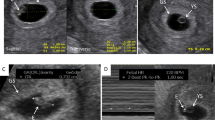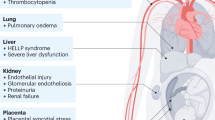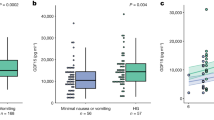Abstract
Refeeding syndrome (RS) in preterm infants is a scenario of fetal malnutrition, primarily resulting from placental insufficiency, followed by a postnatal physiologic adaptation and response to an imbalance of nutrients provided parenterally. Growth restriction and small gestational age status are common findings in infants at risk of developing RS. Adverse clinical outcomes associated with RS may be severe and life-threatening. The biochemical abnormalities that occur in RS may be mitigated through careful monitoring and adaptation of the clinical management of parenteral and enteral nutrition. This perspective reviews the physiology and metabolism in infants with RS and provides suggested approaches to their clinical monitoring and nutritional management.
This is a preview of subscription content, access via your institution
Access options
Subscribe to this journal
Receive 12 print issues and online access
$259.00 per year
only $21.58 per issue
Buy this article
- Purchase on Springer Link
- Instant access to full article PDF
Prices may be subject to local taxes which are calculated during checkout
Similar content being viewed by others
Data availability
Data sharing is not applicable to this perspective as no datasets were generated or analyzed for its development.
References
Sharma D, Shastri S, Sharma P. Intrauterine growth restriction: antenatal and postnatal aspects. Clin Med Insights Pediatr. 2016;10:67–83.
ACOG Practice bulletin no. 134: fetal growth restriction. Obstet Gynecol. 2013;121:1122–33.
Boateng AA, Sriram K, Meguid MM, Crook M. Refeeding syndrome: treatment considerations based on collective analysis of literature case reports. Nutrition. 2010;26:156–67.
Huang X, Anderle P, Hostettler L, Baumann MU, Surbek DV, Ontsouka EC, et al. Identification of placental nutrient transporters associated with intrauterine growth restriction and pre-eclampsia. BMC Genom. 2018;19:173.
Gaccioli F, Lager S. Placental nutrient transport and intrauterine growth restriction. Front Physiol. 2016;7:40.
Cormack BE, Jiang Y, Harding JE, Crowther CA, Bloomfield FH, Pro VTG. Neonatal refeeding syndrome and clinical outcome in extremely low-birth-weight babies: secondary cohort analysis from the ProVIDe trial. J Parenter Enter Nutr. 2021;45:65–78.
da Silva JSV, Seres DS, Sabino K, Adams SC, Berdahl GJ, Citty SW, et al. ASPEN consensus recommendations for refeeding syndrome. Nutr Clin Pract. 2020;35:178–95.
Ross JR, Finch C, Ebeling M, Taylor SN. Refeeding syndrome in very-low-birth-weight intrauterine growth-restricted neonates. J Perinatol. 2013;33:717–20.
Igarashi A, Okuno T, Ohta G, Tokuriki S, Ohshima Y. Risk factors for the development of refeeding syndrome-like hypophosphatemia in very low birth weight infants. Dis Markers. 2017;2017:9748031.
Parramon-Teixido CJ, Gomez-Ganda L, Garcia-Palop B, Lines-Palazon M, Blanco-Grau A, Montoro-Ronsano JB, et al. The influence of parenteral protein intake on electrolyte disturbances in premature infants. Pediatrics. 2021;95:139–46.
Bustos Lozano G, Soriano-Ramos M, Pinilla Martin MT, Chumillas Calzada S, Garcia Soria CE, Pallas-Alonso CR. Early hypophosphatemia in high-risk preterm infants: efficacy and safety of sodium glycerophosphate from first day on parenteral nutrition. J Parenter Enter Nutr. 2019;43:419–25.
Bradford CV, Cober MP, Miller JL. Refeeding syndrome in the neonatal intensive care unit. J Pediatr Pharm Ther. 2021;26:771–82.
Senterre T, Abu Zahirah I, Pieltain C, de Halleux V, Rigo J. Electrolyte and mineral homeostasis after optimizing early macronutrient intakes in VLBW infants on parenteral nutrition. J Pediatr Gastroenterol Nutr. 2015;61:491–8.
Bonsante F, Iacobelli S, Latorre G, Rigo J, De Felice C, Robillard PY, et al. Initial amino acid intake influences phosphorus and calcium homeostasis in preterm infants—it is time to change the composition of the early parenteral nutrition. PLoS One. 2013;8:e72880.
Chaudhary V, Gohil J SP. Hypophosphatemia in refeeding syndrome in intrauterine growth restricted IUGR neonates who are receiving nutrition: a prospective observational study. Asian J Pediatr Res. 2020;3:23–9.
Dreyfus L, Fischer Fumeaux CJ, Remontet L, Essomo Megnier Mbo Owono MC, Laborie S, Maucort-Boulch D, et al. Low phosphatemia in extremely low birth weight neonates: a risk factor for hyperglycemia? Clin Nutr. 2016;35:1059–65.
Hakan N, Aydin M, Dilli D, Zenciroglu A, Okumus N. Transient hyperinsulinemia may be responsible for electrolyte abnormalities of refeeding syndrome seen in very low birth weight infants with intrauterine growth-restriction. J Perinatol. 2014;34:247.
Pezzati M, Barni S, Chiti G, Danesi G, Rubaltelli FF. Prolonged hyperinsulinemic hypoglycemia in a small for date preterm. Minerva Pediatr. 2003;55:79–82.
Mizumoto H, Mikami M, Oda H, Hata D. Refeeding syndrome in a small-for-dates micro-preemie receiving early parenteral nutrition. Pediatr Int. 2012;54:715–7.
Yakubovich D, Strauss T, Ohana D, Taran C, Snapiri O, Karol DL, et al. Factors associated with early phosphate levels in preterm infants. Eur J Pediatr. 2020;179:1529–36.
Moltu SJ, Strommen K, Blakstad EW, Almaas AN, Westerberg AC, Braekke K, et al. Enhanced feeding in very-low-birth-weight infants may cause electrolyte disturbances and septicemia—a randomized, controlled trial. Clin Nutr. 2013;32:207–12.
Mannarino CN, Chaouki AS, de Regnier RA, Robinson DT. Hypophosphatemia in prematurity leading to complete heart block: a case report. J Parenter Enteral Nutr. 2022;46:1203–6.
Beune IM, Bloomfield FH, Ganzevoort W, Embleton ND, Rozance PJ, van Wassenaer-Leemhuis AG, et al. Consensus based definition of growth restriction in the newborn. J Pediatr. 2018;196:71–6 e1.
Boullata JI, Mirtallo JM, Sacks GS, Salman G, Gura K, Canada T, et al. Parenteral nutrition compatibility and stability: a comprehensive review. J Parenter Enter Nutr. 2022;46:273–99.
Hair AB, Chetta KE, Bruno AM, Hawthorne KM, Abrams SA. Delayed Introduction of Parenteral Phosphorus Is Associated with Hypercalcemia in Extremely Preterm Infants. J Nutr. 2016;146:1212–6.
Bombell S, McGuire W. Delayed introduction of progressive enteral feeds to prevent necrotising enterocolitis in very low birth weight infants. Cochrane Database Syst Rev. 2008:CD001970.
Malcolm G, Ellwood D, Devonald K, Beilby R, Henderson-Smart D. Absent or reversed end diastolic flow velocity in the umbilical artery and necrotising enterocolitis. Arch Dis Child. 1991;66:805–7. 7 Spec No
Dorling J, Kempley S, Leaf A. Feeding growth restricted preterm infants with abnormal antenatal Doppler results. Arch Dis Child Fetal Neonatal Ed. 2005;90:F359–63.
Manogura AC, Turan O, Kush ML, Berg C, Bhide A, Turan S, et al. Predictors of necrotizing enterocolitis in preterm growth-restricted neonates. Am J Obstet Gynecol. 2008;198:638 e1–5.
Karagianni P, Briana DD, Mitsiakos G, Elias A, Theodoridis T, Chatziioannidis E, et al. Early versus delayed minimal enteral feeding and risk for necrotizing enterocolitis in preterm growth-restricted infants with abnormal antenatal Doppler results. Am J Perinatol. 2010;27:367–73.
Leaf A, Dorling J, Kempley S, McCormick K, Mannix P, Linsell L, et al. Early or delayed enteral feeding for preterm growth-restricted infants: a randomized trial. Pediatrics. 2012;129:e1260–8.
Dorling J, Abbott J, Berrington J, Bosiak B, Bowler U, Boyle E, et al. Controlled trial of two incremental milk-feeding rates in preterm infants. N Engl J Med. 2019;381:1434–43.
Miller J, Tonkin E, Damarell RA, McPhee AJ, Suganuma M, Suganuma H, et al. A systematic review and meta-analysis of human milk feeding and morbidity in very low birth weight infants. Nutrients. 2018;10:707.
Pajak A, Krolak-Olejnik B, Szafranska A. Early hypophosphatemia in very low birth weight preterm infants. Adv Clin Exp Med. 2018;27:841–7.
Ichikawa G, Watabe Y, Suzumura H, Sairenchi T, Muto T, Arisaka O. Hypophosphatemia in small for gestational age extremely low birth weight infants receiving parenteral nutrition in the first week after birth. J Pediatr Endocrinol Metab. 2012;25:317–21.
Author information
Authors and Affiliations
Contributions
DTR, SNT, and FM contributed equally to the design and writing for this manuscript. DTR, SNT, and FM contributed to the conception and design, equally contributed to the drafting of the manuscript, and critically revised the manuscript. DTR, SNT, and FM gave final approval of this manuscript and agree to be accountable for all aspects of this work ensuring integrity and accuracy.
Corresponding author
Ethics declarations
Competing interests
DTR received compensation for serving as a member of the Data Safety Monitoring Board for a clinical investigation sponsored by Fresenius Kabi in the past 12 months. DTR and SNT serve as institutional principal investigators, with no salary funding, for a consortium database sponsored by Mead Johnson Nutrition. SNT has received an honorarium from Astarte Medical and serves as institutional principal investigator, with no salary funding, to conduct studies sponsored by Ferring Pharmaceuticals, Pfizer, and Prolacta Bioscience. FM receives research funding from Mead Johnson Nutrition.
Additional information
Publisher’s note Springer Nature remains neutral with regard to jurisdictional claims in published maps and institutional affiliations.
Rights and permissions
Springer Nature or its licensor (e.g. a society or other partner) holds exclusive rights to this article under a publishing agreement with the author(s) or other rightsholder(s); author self-archiving of the accepted manuscript version of this article is solely governed by the terms of such publishing agreement and applicable law.
About this article
Cite this article
Robinson, D.T., Taylor, S.N. & Moya, F. Preterm infant nutrition: considerations for infants at risk of refeeding syndrome. J Perinatol 43, 120–123 (2023). https://doi.org/10.1038/s41372-022-01531-1
Received:
Revised:
Accepted:
Published:
Issue Date:
DOI: https://doi.org/10.1038/s41372-022-01531-1



